金笔作文四级第7课
2020年第7课阅读理解精编版

孙老师及全体工作人员祝学员春节快乐!第7课阅读理解2004年职称英语等级考试试题(综合A)第4部分:阅读理解:第1篇:p60Technology Transfer in Germany德国技术转让When it comes to translating basic research into industrial success, few nations can match Germany. Since the 1940s, the nation’s vast industrial base has been fed with a constant stream of new ideas思想, 观念and expertise from science. And though German prosperity(繁荣) has faltered (衰退) over the past decade because of the huge cost of unifying east and west as well as the global economic decline, it still has an enviable (令人羡慕的) record for turning ideas into profit.Much of the reason for that success is the Fraunhofer Society, a network ok research institutes that exists solely to solve industrial problems and create sought-after technologies. But today the Fraunhofer institutes have competition. Universities are taking an eve r larger role in technology transfer, and technology parks are springing up all over. These efforts are being complemented by the federal programmes for pumping money into start-up companies.Such a strategy may sound like a recipe for economic success, but it is not without its critics. These people worry that favouring applied research will mean neglecting basic science, eventually starving industry of fresh ideas. If every scientist starts thinking like an entrepreneur (企业家), the argument goes, then the traditional principles of university research being curiosity-drive, free and widely available will suffer. Others claim that many of the programmes to promote technology transfer are a waste of money because half the small businesses that are promoted are bound to go bankrupt within a few years.While this debate continues, new ideas flow at a steady rate from Germany’s research networks, which bear famous names such as Helmholtz, Max Planck and Leibniz. Yet it is the fourth network, the Fraunhofer Society, that plays the greatest role in technology transfer.Founded in 1949, the Fraunhofer Society is now Europe’s largest organisation f or appled technology, and has 59 institutes employing 12,000 people. It continues to grow. Last year, it swallowed up the Heinrich Hertz Institute for Communication Technology in Berlin. Today there are even Fraunhofers in the US and Asia.31. What factor can be attributed to German prosperity?A.Technology transfer.B.Good management.C.Hard work.D.Fierce competition.32. Which of the following is NOT tru e of traditional university research?A.It is free.B.It is profit-driven.C.It is widely available.D.It is curiosity-driven.33. The Fraunhofer Society is the largest organisation f or applied technology in.A.C.Europe.D.Africa.34. When was the Fraunhofer Society founded?A.In 1940.st year.C.After the unification.D.In 1949.35. The word “expertise” in line 3 could be best replaced byA.“experts”.B.“scientists”.C.“scholars”.D.“special knowledge”.第1篇:Technology Transfer in Germany注:该文中心即文章题目---德国技术转让。
四年级上册第七课的作文45段
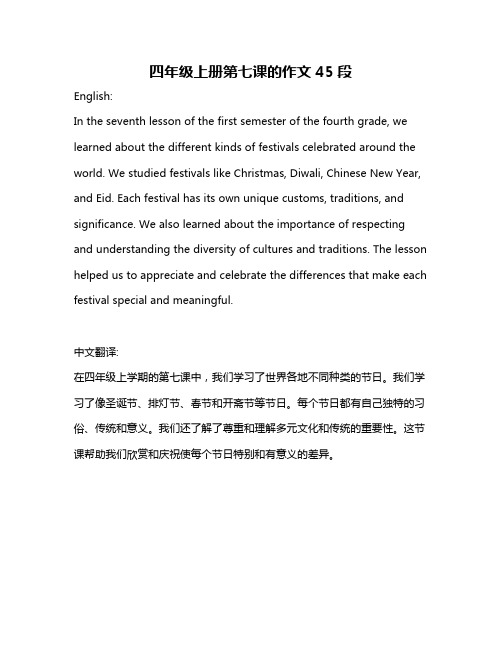
四年级上册第七课的作文45段
English:
In the seventh lesson of the first semester of the fourth grade, we learned about the different kinds of festivals celebrated around the world. We studied festivals like Christmas, Diwali, Chinese New Year, and Eid. Each festival has its own unique customs, traditions, and significance. We also learned about the importance of respecting and understanding the diversity of cultures and traditions. The lesson helped us to appreciate and celebrate the differences that make each festival special and meaningful.
中文翻译:
在四年级上学期的第七课中,我们学习了世界各地不同种类的节日。
我们学习了像圣诞节、排灯节、春节和开斋节等节日。
每个节日都有自己独特的习俗、传统和意义。
我们还了解了尊重和理解多元文化和传统的重要性。
这节课帮助我们欣赏和庆祝使每个节日特别和有意义的差异。
四下第7课仿写作文
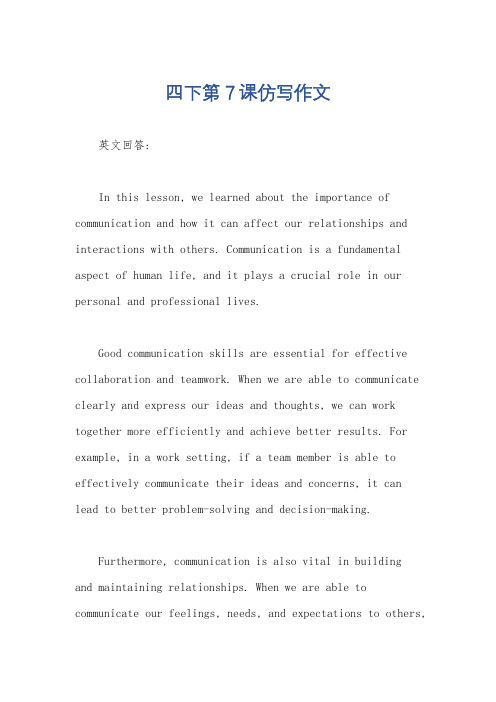
四下第7课仿写作文英文回答:In this lesson, we learned about the importance of communication and how it can affect our relationships and interactions with others. Communication is a fundamental aspect of human life, and it plays a crucial role in our personal and professional lives.Good communication skills are essential for effective collaboration and teamwork. When we are able to communicate clearly and express our ideas and thoughts, we can work together more efficiently and achieve better results. For example, in a work setting, if a team member is able to effectively communicate their ideas and concerns, it can lead to better problem-solving and decision-making.Furthermore, communication is also vital in buildingand maintaining relationships. When we are able to communicate our feelings, needs, and expectations to others,it helps to create a sense of trust and understanding. For instance, in a romantic relationship, open and honest communication is key to resolving conflicts and building a strong foundation.Moreover, effective communication can also help in resolving conflicts and preventing misunderstandings. When we are able to express ourselves clearly and actively listen to others, it reduces the chances of misinterpretation and can lead to a peaceful resolution. For example, in a disagreement between friends, if both parties are able to communicate their perspectives and actively listen to each other, they can find a compromise and maintain their friendship.中文回答:在这节课中,我们学习了沟通的重要性以及它如何影响我们与他人的关系和互动。
职称英语补全短文 第7课时
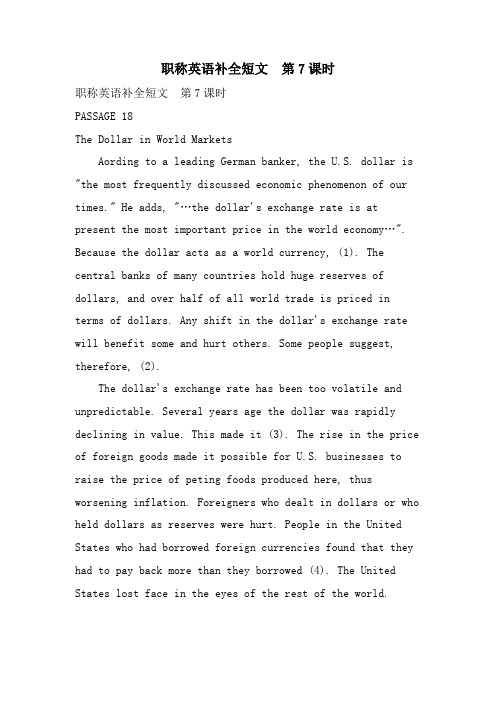
职称英语补全短文第7课时职称英语补全短文第7课时PASSAGE 18The Dollar in World MarketsAording to a leading German banker, the U.S. dollar is "the most frequently discussed economic phenomenon of our times." He adds, "…the dollar's exchange rate is at present the most i mportant price in the world economy…". Because the dollar acts as a world currency, (1). The central banks of many countries hold huge reserves of dollars, and over half of all world trade is priced in terms of dollars. Any shift in the dollar's exchange rate will benefit some and hurt others. Some people suggest, therefore, (2).The dollar's exchange rate has been too volatile and unpredictable. Several years age the dollar was rapidly declining in value. This made it (3). The rise in the price of foreign goods made it possible for U.S. businesses to raise the price of peting foods produced here, thus worsening inflation. Foreigners who dealt in dollars or who held dollars as reserves were hurt. People in the United States who had borrowed foreign currencies found that they had to pay back more than they borrowed (4). The United States lost face in the eyes of the rest of the world.The dollar went soaring upward, and the situation was reversed. United States exporters found it hard to sell abroad because foreigners would have to pay more for U.S. dollars. People in the United States now bought the relatively cheaper foreign goods, and U.S. manufacturers plained that they could not pete. Job losses were often blamed on the "overvalued" dollar. Poor nations (5) found it difficult to repay both the loans and the interest because they had to use more and more of their own currencies to obtain dollars. The solution to this problem is to end the system of floating exchange rates and return to fixed rates. We might even return to the gold standard.Fixed exchange rates did not work in the past. Currency values should be determined by market conditions. A drop i。
四下第7课仿写作文
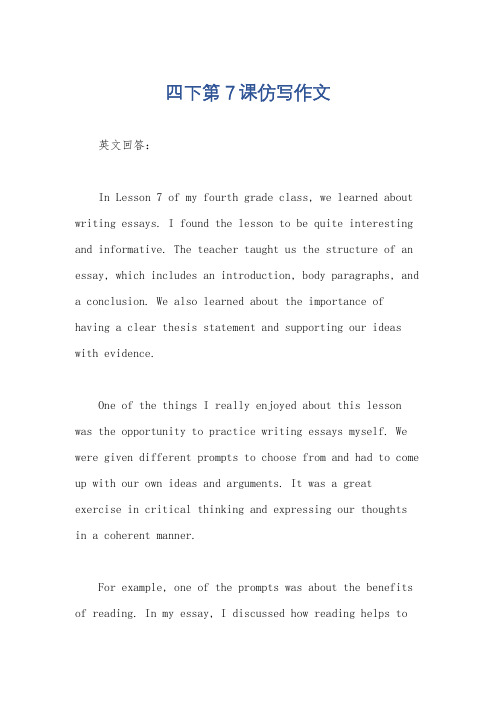
四下第7课仿写作文英文回答:In Lesson 7 of my fourth grade class, we learned about writing essays. I found the lesson to be quite interesting and informative. The teacher taught us the structure of an essay, which includes an introduction, body paragraphs, and a conclusion. We also learned about the importance of having a clear thesis statement and supporting our ideas with evidence.One of the things I really enjoyed about this lesson was the opportunity to practice writing essays myself. We were given different prompts to choose from and had to come up with our own ideas and arguments. It was a great exercise in critical thinking and expressing our thoughtsin a coherent manner.For example, one of the prompts was about the benefits of reading. In my essay, I discussed how reading helps toimprove vocabulary, enhance imagination, and broaden one's knowledge. I also shared a personal experience of how reading a particular book inspired me to pursue a new hobby.Another prompt was about the impact of technology onour lives. In my essay, I talked about how technology has made our lives more convenient but also highlighted the importance of finding a balance and not becoming too dependent on it. I gave examples of how excessive use of technology can lead to social isolation and health issues.Overall, I found this lesson to be very helpful in improving my writing skills. It not only taught me how to structure an essay but also encouraged me to thinkcritically and express my ideas effectively. I believethese skills will be valuable not only in my academic journey but also in my future career.中文回答:第七课是关于写作文章的。
英语作文第7课
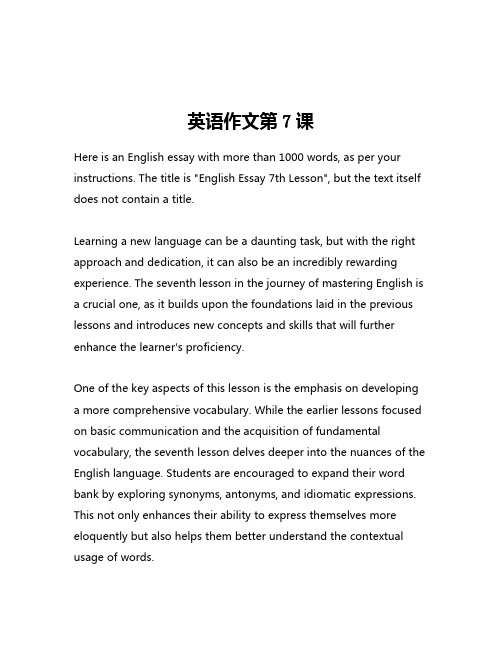
英语作文第7课Here is an English essay with more than 1000 words, as per your instructions. The title is "English Essay 7th Lesson", but the text itself does not contain a title.Learning a new language can be a daunting task, but with the right approach and dedication, it can also be an incredibly rewarding experience. The seventh lesson in the journey of mastering English is a crucial one, as it builds upon the foundations laid in the previous lessons and introduces new concepts and skills that will further enhance the learner's proficiency.One of the key aspects of this lesson is the emphasis on developing a more comprehensive vocabulary. While the earlier lessons focused on basic communication and the acquisition of fundamental vocabulary, the seventh lesson delves deeper into the nuances of the English language. Students are encouraged to expand their word bank by exploring synonyms, antonyms, and idiomatic expressions. This not only enhances their ability to express themselves more eloquently but also helps them better understand the contextual usage of words.In addition to vocabulary expansion, the seventh lesson also places a strong emphasis on improving reading comprehension. Learners are exposed to a variety of text genres, ranging from academic articles to literary works, and are tasked with understanding the underlying meaning, identifying key themes, and analyzing the author's writing style. This exercise not only strengthens their reading skills but also helps them develop a more critical and analytical mindset when approaching written material.Another crucial component of the seventh lesson is the focus on enhancing writing skills. Students are challenged to produce more complex and well-structured compositions, ranging from essays to research papers. They learn to effectively organize their thoughts, develop coherent arguments, and employ appropriate rhetorical devices to convey their ideas. This process not only improves their written communication but also encourages them to think more deeply about the topics they are exploring.Alongside the development of writing skills, the seventh lesson also emphasizes the importance of improving oral communication. Learners are given opportunities to engage in more sophisticated discussions, debates, and presentations, where they are required to articulate their thoughts clearly, respond to counterarguments, and maintain a confident and engaging delivery. This exercise helps them become more comfortable with public speaking and enhances theirability to effectively communicate their ideas in a variety of settings.One of the unique aspects of the seventh lesson is the integration of cultural awareness and cross-cultural communication. Students are encouraged to explore the nuances of English-speaking cultures, including their customs, traditions, and social norms. This understanding not only helps them navigate intercultural interactions more effectively but also fosters a deeper appreciation for the diversity and richness of the English-speaking world.Moreover, the seventh lesson often incorporates the use of technology and multimedia resources to enhance the learning experience. Learners are exposed to a wide range of online tools, such as language learning apps, virtual classrooms, and interactive educational platforms. These resources not only make the learning process more engaging but also provide opportunities for self-directed study and personalized feedback.As students progress through the seventh lesson, they are also encouraged to develop a more critical and analytical approach to the language. They are challenged to examine the underlying structures, grammatical rules, and linguistic patterns of English, not just as a means of communication but as a complex and fascinating system of expression. This deeper understanding not only strengthens their overall proficiency but also cultivates a genuine appreciation for thelanguage.Throughout the seventh lesson, learners are also exposed to the importance of continuous learning and self-improvement. They are encouraged to set personal goals, track their progress, and seek out opportunities for further development, such as language exchange programs, study abroad experiences, or professional development courses. This mindset of lifelong learning is essential for maintaining and enhancing their English language skills over time.In conclusion, the seventh lesson in the journey of mastering English is a pivotal stage that builds upon the foundations laid in the previous lessons. By focusing on vocabulary expansion, reading comprehension, writing skills, oral communication, cultural awareness, and the integration of technology, this lesson equips learners with the tools and strategies necessary to become more proficient and confident users of the English language. As students navigate this crucial step, they not only improve their linguistic abilities but also develop a deeper appreciation for the richness and complexity of the English language.。
四下第七课仿写4~3自然段作文
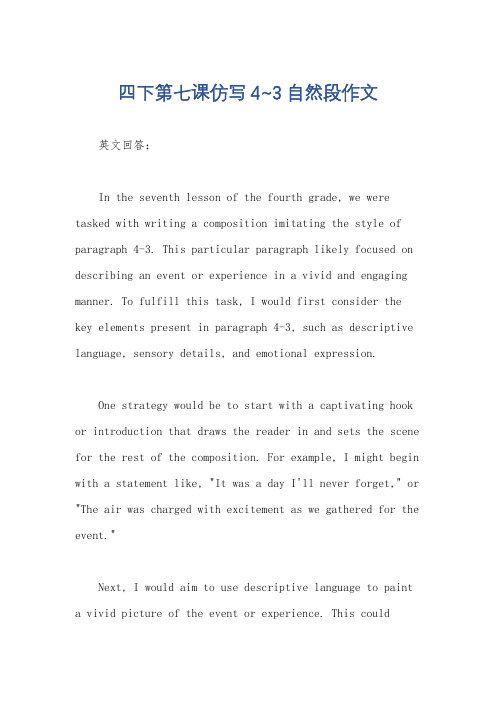
四下第七课仿写4~3自然段作文英文回答:In the seventh lesson of the fourth grade, we were tasked with writing a composition imitating the style of paragraph 4-3. This particular paragraph likely focused on describing an event or experience in a vivid and engaging manner. To fulfill this task, I would first consider the key elements present in paragraph 4-3, such as descriptive language, sensory details, and emotional expression.One strategy would be to start with a captivating hook or introduction that draws the reader in and sets the scene for the rest of the composition. For example, I might begin with a statement like, "It was a day I'll never forget," or "The air was charged with excitement as we gathered for the event."Next, I would aim to use descriptive language to paint a vivid picture of the event or experience. This couldinvolve appealing to the senses by describing what I saw, heard, felt, smelled, and even tasted. For instance, if I were describing a school field trip to the zoo, I mightwrite about the vibrant colors of the exotic birds, theroar of the lions, the warmth of the sun on my skin, andthe smell of popcorn from the snack stand.In addition to sensory details, I would also focus on conveying the emotions and feelings associated with the event. This could involve reflecting on my own thoughts and reactions, as well as those of others involved. For example, I might describe the sense of wonder and awe I felt when seeing certain animals up close, or the camaraderie and excitement shared among classmates during the trip.To conclude the composition, I would aim to tie everything together and leave the reader with a lasting impression. This could involve summarizing the main points, reflecting on the significance of the experience, oroffering a thought-provoking insight or observation. For example, I might end with a reflection on how the trip deepened my appreciation for the natural world, or areminder of the importance of cherishing memorable moments with friends and loved ones.Overall, by following the structure and style of paragraph 4-3, I can create a compelling and engaging composition that effectively captures the essence of the event or experience.中文回答:在四年级第七课中,我们被要求写一篇仿照第四单元第三段的作文。
英语七下第七课仿写作文范文
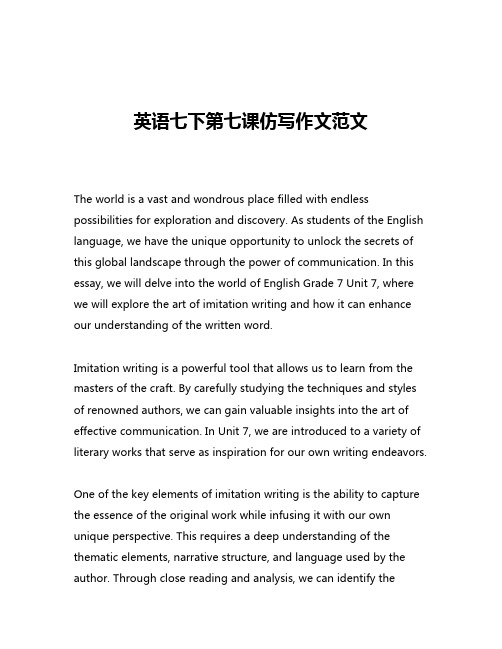
英语七下第七课仿写作文范文The world is a vast and wondrous place filled with endless possibilities for exploration and discovery. As students of the English language, we have the unique opportunity to unlock the secrets of this global landscape through the power of communication. In this essay, we will delve into the world of English Grade 7 Unit 7, where we will explore the art of imitation writing and how it can enhance our understanding of the written word.Imitation writing is a powerful tool that allows us to learn from the masters of the craft. By carefully studying the techniques and styles of renowned authors, we can gain valuable insights into the art of effective communication. In Unit 7, we are introduced to a variety of literary works that serve as inspiration for our own writing endeavors.One of the key elements of imitation writing is the ability to capture the essence of the original work while infusing it with our own unique perspective. This requires a deep understanding of the thematic elements, narrative structure, and language used by the author. Through close reading and analysis, we can identify thetechniques that make a particular piece of writing compelling and then apply those principles to our own work.For example, let's consider the classic short story "The Necklace" by Guy de Maupassant. In this tale, we are introduced to Mathilde Loisel, a young woman who longs for a life of luxury and prestige. When she borrows a diamond necklace from a wealthy friend, she experiences a night of glamour and excitement. However, the necklace is lost, and Mathilde and her husband are forced to toil for years to repay the cost of the missing jewel.As we study this story, we can observe the author's masterful use of character development, plot twists, and vivid imagery to create a captivating narrative. By imitating these techniques in our own writing, we can craft stories that resonate with readers and convey powerful messages about the human experience.Another important aspect of imitation writing is the ability to adapt the original work to our own cultural and personal contexts. While we may be inspired by the themes and techniques of a particular literary piece, we must also find ways to make it our own. This may involve incorporating elements of our own lived experiences, exploring different perspectives, or even experimenting with alternative narrative structures.In Unit 7, we are encouraged to explore a variety of writing styles and genres, from personal narratives to persuasive essays. By immersing ourselves in these diverse forms of expression, we can develop a deeper appreciation for the nuances of language and the power of the written word.For instance, let's consider the task of writing a personal narrative inspired by the experiences of the characters in "The Necklace." We might choose to tell the story from the perspective of Mathilde's husband, exploring his struggles to provide for his wife and the sacrifices he makes to repay the lost necklace. Alternatively, we could imagine the story from the point of view of the wealthy friend who lent the necklace, delving into the complexities of social class and the burden of material possessions.Through this process of imitation and adaptation, we not only hone our writing skills but also gain a deeper understanding of the human condition. We learn to empathize with the experiences of others, to consider multiple perspectives, and to find our own unique voices within the tapestry of literature.As we progress through Unit 7, we will encounter a range of literary works that challenge us to stretch our writing abilities. From analyzing the persuasive techniques used in a political speech to crafting a personal narrative inspired by a classic short story, we willhave the opportunity to explore the boundless possibilities of the English language.In conclusion, the art of imitation writing is a powerful tool that can unlock the secrets of effective communication and deepen our understanding of the human experience. By carefully studying the techniques and styles of renowned authors, we can develop our own unique voices and create compelling works of literature that resonate with readers across the globe. As we embark on this journey through Unit 7, let us embrace the challenge of imitation writing and strive to become masters of the written word.。
- 1、下载文档前请自行甄别文档内容的完整性,平台不提供额外的编辑、内容补充、找答案等附加服务。
- 2、"仅部分预览"的文档,不可在线预览部分如存在完整性等问题,可反馈申请退款(可完整预览的文档不适用该条件!)。
- 3、如文档侵犯您的权益,请联系客服反馈,我们会尽快为您处理(人工客服工作时间:9:00-18:30)。
下吧下吧我要长大 滴答,滴答,下雨啦,下雨啦。 麦苗说:“下吧,下吧,我要长大。” 桃树说:“下吧,下吧,我要开花。” 葵花子说:“下吧,下吧,我要发芽。” 小弟弟说:“下吧,下吧,我要种瓜。” 滴答,滴答,下雨啦,下雨啦。
小结:今天我们一起学习了 写人作文,如何用我们的巧 手描绘一下身边的人,注意 在描绘的时候,一定要抓住 人物的特点。
是通过哪些方面来表现这些特点的? ……
我的爸爸
两道扫帚眉下一双细细的眼睛,一个大大的鼻子……就组合成了我亲爱的 爸爸。 爸爸可关心我的学习了。记得有一次,快要考试了。放学后,我急急忙忙 的跑回家,坐在沙发上看书。突然,爸爸走到了我的身旁,我好奇地问:“爸 爸,您怎么来了?如果没事,您去做饭吧。我还要复习呢。”我假装拉长着脸 说。爸爸笑嘻嘻地说:“哪能没事呢?我来帮你复习。”我一听这话,心想:爸 爸怎么突然要帮我复习?一定有什么事瞒着我。我眯着眼睛对爸爸说:“您不 会就这样帮我复习的,一定有事,对吧?”爸爸摸了摸头说:“哎呀,这样的机 密都被你猜中了,考试一定能考个好成绩。”“爸爸,我说您别小看我吧,您还 不服气。有什么花招,赶紧使出来吧!”我得意洋洋地说。爸爸一笑,从背后 变戏法似的摇出一支钢笔:“祝宝贝女儿考试顺利,再创佳绩。”“哇,谢谢爸 爸!一定不让你失望。”我说。 你看我爸爸多好,羡慕吧!
《我的妈妈》
咱们一起来看一下你要写的人物是谁? 那么你最想写妈妈的那一点呢?
那么怎么让别人知道她具有这方面的特点呢?
问 题:
这一段主要抓住了班长的那一点进行描写的? 班长的“辣”是通过她的那些方面来表现的?
我来写作文
1、以《我的作文老师》为题,把刚才说的 内容写一写。 2、抓住妈妈的一个特点来写; 3、选取一件事情表现这个特点, 加入相关的语言、动作、神态、外貌描 写等; 4、字数300字左右,字体工整。
• 如何进行人物描写?
小结:
第一步:确定你要写谁 ?
第二点:这个人有什么样的特点?
第三点:我们是怎么知道的呀?
第四点:哪些方面体现人物的特点
外貌
语言 动作
神态
心理描写等
通过
外貌 动作 语言 神态描写
等来表现人物的特点
• 表演开始,表演的时候可以借助其他同学和 物品来表演,其他同学要仔细观察。
பைடு நூலகம்
1、回家向爸爸妈妈讲一讲你在课堂上的作文 写的是谁? 2、阅读《金笔思维》上的《范文择归》部分。
刚才同学的表演哪一点给你留下的 印象比较深 ?
你是从哪些地方看到他表演技能比较高? 我们在描绘一个人的时候,首先说一下他的 样子。(主要从动作、外貌上来说)
大家再来想一下,开始他是怎 么表演的?
接下来他是如何表演的?
刚才主要描写的是谁? …… 我们抓住了她的那一点? …… 我们是怎么知道的呀? ……
要求:1、一个同学表演,一个同学猜。 2、表演的同学不能说话,只能用 动作、神态来提示他。
谁愿意上台表演?
刚才老师宣布谁愿意上台表演游戏的时候, 谁表现得和别人不一样
你认为他哪个方面和别人不一样?
你从哪儿发现他比较善于表达? 还可以从哪个地方来看?
还有吗?
• 刚才我们通过外貌、动作、语言、神态等 方面表现课上比较善于表现的同学,以后 我们在描写人物某个方面的特点时也要通 过人物的外貌、语言、动作、神态描写等 方面来表现。 • 老师找个同学连起来说一说。
老师今天做一次记者,采访一下大家最近都看 过哪些动画片?
剧中的哪些人物给你留下的印象最深刻?
为什么这些人物让你看了以后不会忘记呢? 其实是剧本的作者抓住了人物的特点,把人物 写活了,我们身边也有很多人,你能不能把 他们写到作文中,让别人读了以后也念念不 忘呢? 接下来老师就把这种本领教给大家,今天就用 你们自己的巧手描绘一下身边的人。
1、这篇作文写的是谁? 2、你能准确说出他的特点吗? 3、这篇文章通过一件什么事来反映人物特点的呢? 4、从文中找出人物的外貌描写、语言描写、动作描写、 心理描写的句子,用“——”标出来。
乐乐提示: 在日常生活中,不管做什么事情, 都要有条理性,房间摆设井井有序, 用过的东西放回原处,以免需要的时候找不到; 晚上睡觉之前,整理好书包,准备好第二天要穿的衣 服等; 上课前把文具和课本摆放好,老师看看谁的桌面上现 在比较乱?
